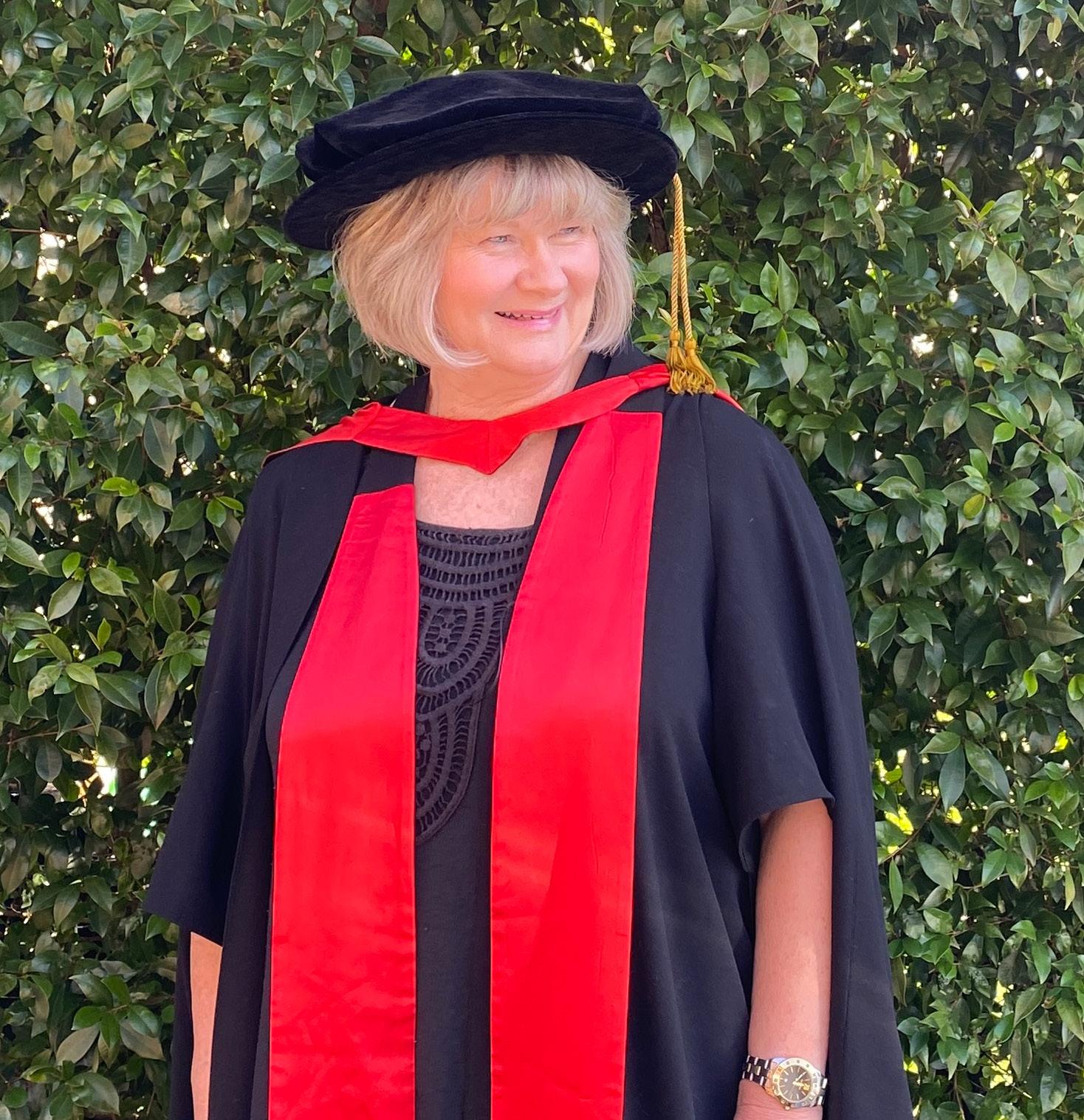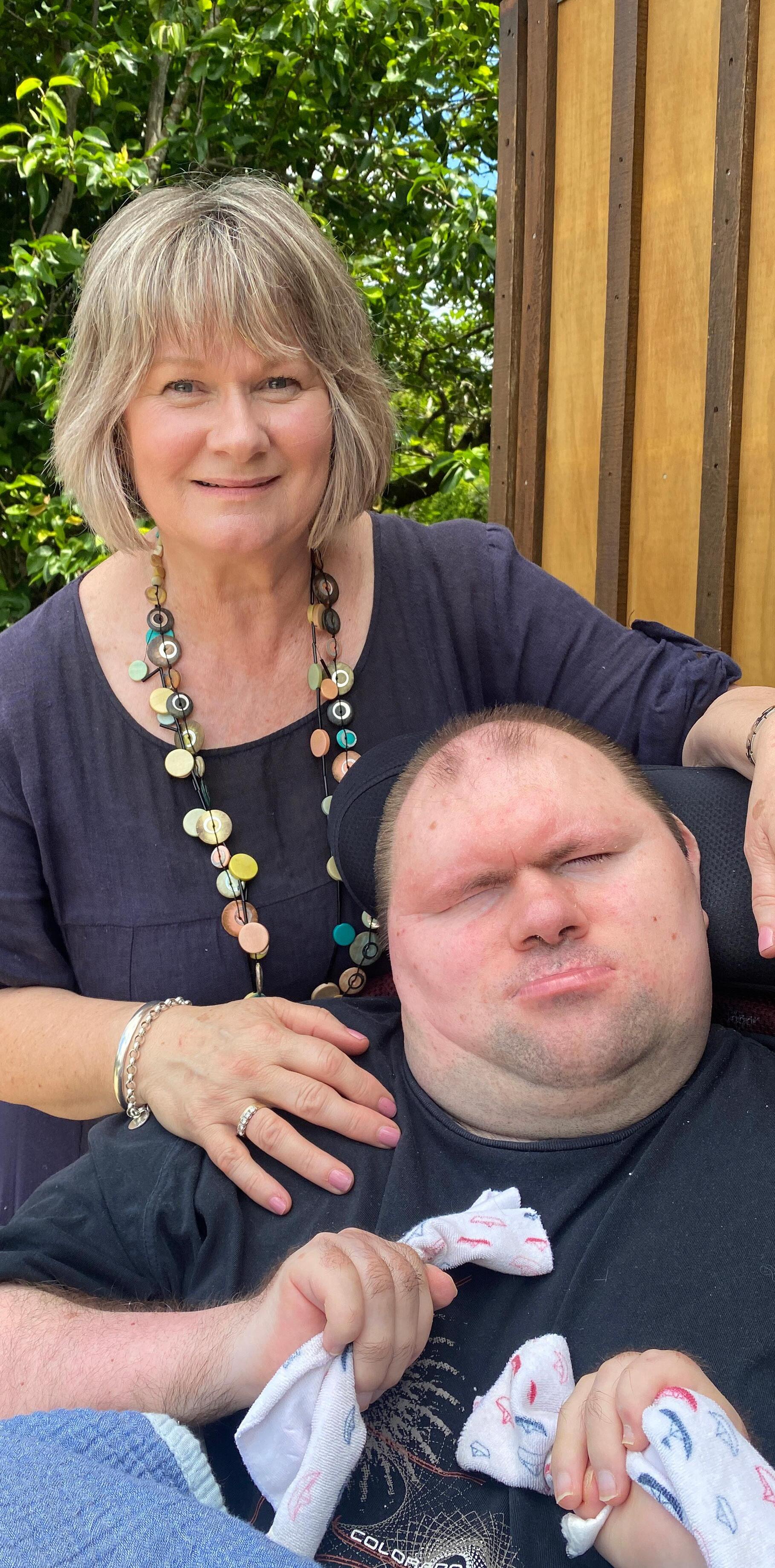
10 minute read
Fullness of Life for All
Coralie Bridle is a familiar name to many Salvationists. She has been, and continues to be, a prophetic voice within The Salvation Army for disability justice. SALT sat down with the now ‘Dr’ Coralie to discuss the findings of her 370-page doctoral thesis, titled ‘An Army that Brings Life? Complex Disability, The Salvation Army and Fullness of Life’.
WORDS Jules Badger
When Coralie’s son Sam was three months old he stopped breathing while sleeping. As an oncology nurse at the time, Coralie resuscitated Sam, but lack of oxygen to the brain left him with significant, complex disabilities. It is this lived experience that underpins the heart of Dr Coralie Bridle’s doctoral thesis.
The thesis is a challenging piece of work to read; it’s theologically weighty and personally confronting. The call to sincere repentance and just action reverberates from its pages. Crucially, it speaks directly to the heart of the Army’s current vision: Together we live out the good news of Jesus Christ so that everyone can experience hope, wholeness and ongoing transformation—the fullness of life as God intended.
Boldly advocating for authentic inclusion of people with disabilities and their families, Coralie is nervous about the Army’s response to her work, but also proud that the movement has been so open to self-examination.
‘How utterly marvellous that the Army is not frightened to critique itself and its practice,’ she says. ‘Not content to rest on our laurels but to ask, can we do better? What is the Holy Spirit saying to The Salvation Army today? What was the example set by co-founders William and Catherine Booth that moves us toward the vulnerable and marginalised of 2024?
Jesus sat with those no one else would sit with. Who are those being kept from hearing the gospel because we don’t sit around the table with them? Who are those not experiencing the fullness of life? What are we going to do about that?’
A voice for others
Coralie is grateful to people within the movement who participated in interviews, especially those living with disabilities and their families. It was a five-year project, with Covid-19 lockdowns and travel restrictions, and then the sudden and unexpected death of dearly loved husband, Kevin. Completing the thesis was touch and go, but in the end the driving force became the stories of those who had shared so openly and generously with Coralie about their experience of disability within the Army.
‘The voices of the participants kept ringing in my ears,’ she says. ‘People had given up their time and come with all their vulnerability to share with me. Some cried as I sat with them. I couldn’t deny giving voice to their stories.’
Coralie is regularly beset with imposter syndrome. ‘There are days when I just can’t believe I’ve done this,’ she says. Asked to describe herself, the humble 64-year-old weeps as she says, ‘I’m very much a child of God. I feel full of grief for Kevin. At times I am lonely and sad and regularly ask myself what am I supposed to do with my post-PhD life?’ But then she sits up straight and clenches her fists and declares with energy and urgency, ‘but I am also the friend of Jesus! His example makes me passionate about caring for the vulnerable. Jesus stopped and noticed people and brought healing, not just cure. So I also try to be a vessel for the Holy Spirit to work through. How can Sam and I together embody God’s grace and light so that we are all moved toward fullness of life? The story of our family’s disability journey is deeply part of who I am.’

Language matters
So how do we talk about disability in a way that brings life? Coralie quotes Amy Kenny, author of My Body is Not a Prayer Request, who explains that ‘much ink has been spilled over whether we should use people-first language (“people with disabilities”) or identity-first language, (“disabled people”) when talking about disability’.
Amy states that she prefers identity-first language. ‘For me, choosing this moniker is a way of shunning the shame often associated with disability and proclaiming that “disability” is not a bad word. I am not a euphemism or a metaphor. I am disabled,’ she affirms.
Coralie uses both styles interchangeably in her thesis, ‘New Zealand has been very strong on adopting people-first language but even this is changing, and internationally there is a real mix. Some see their disabled identity as giving them a sense of belonging to a community and “d/Deaf” culture is a clear example of this. Please ask people how they like to be identified,’ she advises.
Prophetic witness
An ongoing frustration for disabled people and their carers is the assumption by many Christians that disability is a result of the Fall (see Genesis 3).
‘The idea that people with disabilities are a result of the Fall is simplistic, reductive and, quite frankly, insulting,’ says Coralie. ‘It dehumanises disabled people, so on that basis alone it’s illogical. If the Fall is universal, which we would say it is, then my lack of disability is also a result of the Fall. Either we are all made in the image of God or none of us are. The world is full of ecological degradation—genes mutate, we age, people do bad things and accidents happen. That does not mean that the person who ends up with the disability is culpable in something to do with the Fall.’
Amy concurs, adding:
We become scapegoats, with people rushing up to cure us, hoisting the world’s problems onto our bodies instead of asking tough questions about how they participate in a system that keeps our bodies down. We represent people’s worst fears … But, in reality, we display the prophetic witness of what is true for all humans. All bodies are interdependent and fragile; ours just make it more evident. All humans bear the image of God: that doesn’t diminish after the Fall— or even after a fall that results in a disability.
And here lies the challenge. To what extent have we contributed to the suffering of disabled people because of bad theology? Our own fears and prejudice? Or simply a lack of compassion for those with different needs to our own?
Now is the kingdom…
Coralie’s thesis delves into models of disability: theology, human rights, activism and much more. But key themes run through her work, the first of which is foundational to her theological approach and the bedrock of the Army’s vision.
We need to re-examine our understanding of what fullness of life means and re-orientate ourselves away from it being something we get when we die and go to heaven. Fullness of life is the inbreaking rule and reign of Christ now! A disabled person—any person— should be able to experience healthy community and have good relationships. To know that we are seen and loved for who we are, and that there is purpose to our lives. To understand what it is to be trusted, to experience joy and peace. The kingdom now should be a multi-lingual, multi-cultural, multi-ability, multi-ness in which everyone finds their place and experiences the fullness of life.

The role of the Church, urges Coralie, ‘is to help one another come into that experience of fullness of life’.
A second theme recognises people with disabilities as co-labourers in the kingdom. ‘It’s not just about ministering to disabled people,’ says Coralie. ‘It’s about recognising that everyone brings something to the table—whatever their life experience of embodiment happens to be. There must be mutuality. It’s not just about the non-disabled person inviting the disabled person to join in. We minister together. I learn from you, and you learn from me.’
Image bearers
Reflecting on her 36-year journey as mother, carer and advocate for Sam, Coralie says that Sam’s disability is not a disaster—another important theme of her thesis. What makes disability difficult is the misunderstanding of others.
Another theme touches on the common misconception that if we don’t know enough about disability we shouldn’t get involved. She urges us to find our courage and just ‘take tea’ with a disabled person and begin to form a relationship in the same way we would with anyone else.
Our human embodiment might be different, but we all want the same thing—to be seen for who we really are and witnessed by the world as a person made in the image of God.
God knows and understands the longings of Sam’s heart—even the ones he can’t express and that I’m not attuned to as his carer. Jesus knows what it is to live as a human being, and the Godhead knows the pain and suffering of Christ. The Godhead is therefore aware of what it is like to be bound by limbs that don’t work properly. There is a deep comfort for me as a mother to know that what I can’t reach because of Sam’s lack of comprehension or capacity to speak to me, is known by Jesus.
A shared table
Coralie champions authentic inclusion which covers both literal and metaphorical spaces. ‘I want us to move away from just thinking about due diligence when it comes to disability. Ramps, carparks and a wheelchair-accessible toilet are essential legal requirements, but this is a minimalist approach.’
A fullness of life approach looks like authentic inclusion at a shared table—‘nothing about us without us’. Such a space carries with it the imperative of helping build the shared table, the invitation to take a position at the table and the opportunity to lead from the table.
Coralie writes:
Embrace that is anything less presents an unstable table. Such tables, where claims of ignorance, tokenism and lack of embrace preside, ultimately undermine the very essence of a shared table. At these tables, disabled people can become categorised, and ill-conceived capability dynamics can dominate the table. In contrast, well-crafted shared tables embrace new ways to build relationships, willingly share space in all its dimensions and are led by everyone around the table into new ways of being the church.
New ways of knowing, doing and being…
Coralie’s thesis gently but firmly concludes that:In the context of complex disability and within local Salvation Army corps settings, an understanding of disability and provision of support towards an experience of fullness of life are not as robust and consistent as they might be. While there is evidence of good practice in some spaces, there is also evidence that some disabled people do not consider themselves, or their relatives, as either missional priorities or missional partners in the transformative agenda and work of The Salvation Army in New Zealand.
Ultimately, we must repent of our reluctance to embrace those whom we perceive to be different. Turning toward Jesus and away from sin (dehumanisation/neglect) indicates a leaving behind of old ways of knowing, being and doing. Similarly, turning towards disabled people indicates an intentionality to pursue more constructive ways of knowing, being and doing.
Her challenge is clear: fullness of life for all begins with repentance and the willingness to unlearn and relearn. It is time to come together around the table.
To read Dr Coralie Bridle’s full thesis, go to hdl.handle.net/10292/17148










